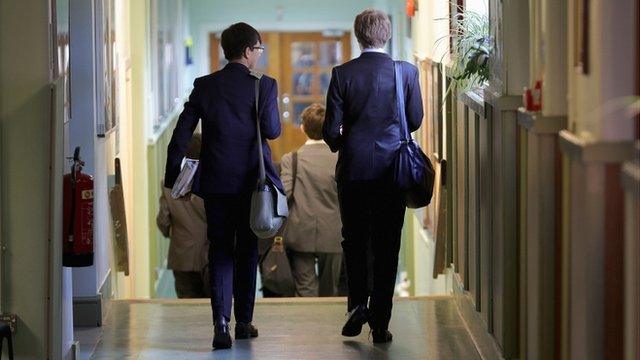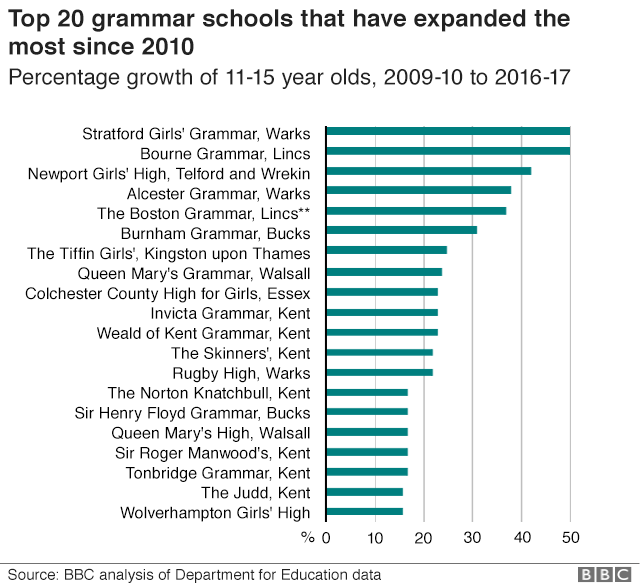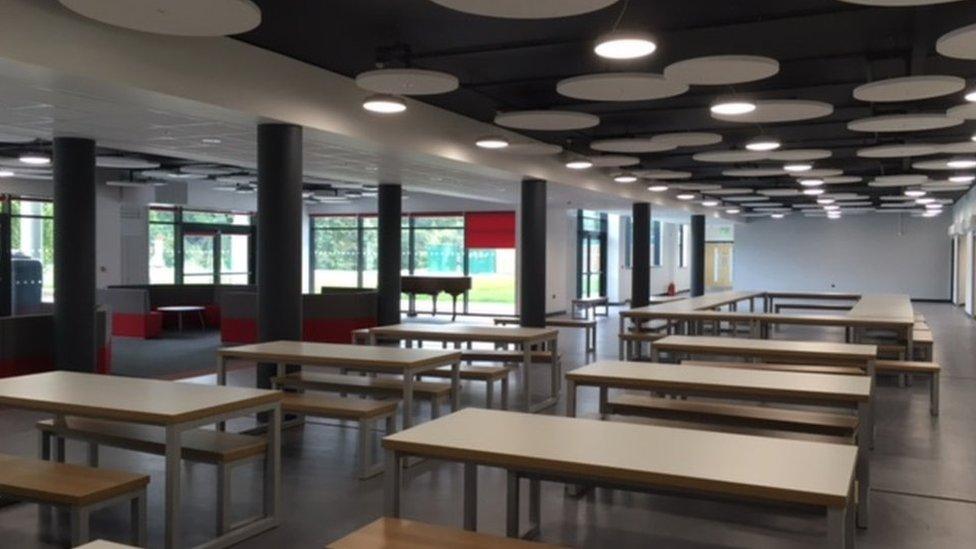Grammar schools and faith schools get green light to expand
- Published

Grammar schools in England are being given the chance to create thousands of new places in a trimmed-down selective school expansion programme.
The expanded wholly selective schools will have to set out plans to admit disadvantaged pupils, perhaps by lowering the entrance requirements.
It comes after Theresa May's scheme for a new wave of grammars was abandoned due to lack of Parliamentary support.
Plans for new faith schools have also been announced.
But instead of making it easier for religious groups to open free schools, ministers will invite councils to open faith schools jointly with religious groups, as they have done in the past.
As with other faith schools in the state sector, they will be allowed to recruit 100% of pupils from particular faith groups.
Spin-off sites
Grammar schools are controversial as they select all their pupils on the basis of ability tests, known as the 11-plus, which children take at the age of 10 or 11.
Opponents say they "cream off" the smartest pupils from neighbouring schools.
Mr Hinds said the plans, which invite grammar schools to bid for cash from a £50m expansion fund, would "give parents greater choice".
The funding was originally part of a bigger package of proposals to bring back selective education, but it comes at a time when schools across England are struggling with their budgets.
Teachers' union leaders have criticised the move as a misuse of school spending.
Kevin Courtney, leader of the National Education Union, said: "The grammar school corpse has climbed out of its coffin once again despite evidence of the damage that selective education causes."
The trimmed-down expansion plans will allow grammars to grow bigger or to develop spin-off sites along the lines of the Sevenoaks "annexe" built by Weald of Kent Grammar School in Tonbridge last year.
This school is 10 miles from its main site, and has room for 450 pupils.

Schools have been warning about budget shortages
The National Association of Head Teachers and the Association of School and College Leaders said it was wrong to fund grammar schools when school budgets were tight.
But the Grammar School Heads' Association welcomed the move. It has been working with the Department for Education on the expansion idea and has agreed the way forward.
Chief executive Jim Skinner said: "We are very pleased that, like other good and outstanding schools, selective schools now have access to a fund to allow them to expand their premises.
"This is particularly important at a time when there are increasing numbers of pupils reaching secondary age and such a high demand for selective school places."
Last week, in an address to head teachers, Mr Hinds acknowledged the funding pressure on schools, but did not offer any short-term prospect of extra funds.
Faith schools
The Conservatives also promised during the election campaign to remove the cap on faith-based free schools, which stops them allocating more than 50% of their places on grounds of religion - which would have brought them in line with other faith schools in the state sector.
But the government has ditched this promise - and instead says it will provide funds for local authorities to create a new generation of "voluntary-aided" faith schools.
These will be able to be fully selective on grounds of religion - and the funding for their creation will be taken from the pot of money set for the creation of new free schools.
The Local Government Association welcomed the government's decision to work with councils to open new schools.
But it said the focus should not be exclusively on selective, faith-based and free schools and that the best way to meet the demand for school places was to let councils open more schools themselves.
'Obsession'
Shadow Education Secretary Angela Rayner said: "The continued obsession with grammar schools will do nothing for the vast majority of children, and it is absurd for ministers to push ahead with plans to expand them when the evidence is clear that they do nothing to improve social mobility."
But Katie Ivens, from the Campaign for Real Education, said middle-class children dominated grammar schools because there were not enough places available.
"If you spread grammar school places throughout the country and make them available to lots of disadvantaged children then you would give these disadvantaged children the same opportunity to get an academic education."

Ellie Mulcahy, senior research associate at education and youth think and action tank LKMco, said: "Even if these grammar schools open up their entry to allow a proportion of disadvantaged pupils to come in, that will be only for those who do well in the test, whether they've been coached or not.
"We really need to be thinking about the majority of pupils that wouldn't be able to get into these schools and the fact that they, just as much as their peers who have attained more highly on that particular test, deserve to have a really high-quality education."
Archbishop Malcolm MacMahon, speaking on behalf of the Catholic education sector, said the government had "broken a promise" over changes to free school admissions - but Humanists UK described the retention of their 50% cap as a "victory for integration".
The Church of England welcomed the opportunity to open new schools - and said dropping the plans to change the rules over free schools would not "impact on that commitment".
Launching the plans, Mr Hinds said: "Children only get one chance at an education and they deserve the best, wherever they live and whatever their background.
"By creating new schools where they are needed most and helping all great schools to grow, we can give parents greater choice in looking at schools that are right for their family - and give children of all backgrounds access to a world-class education."
- Published8 September 2017

- Published4 November 2016